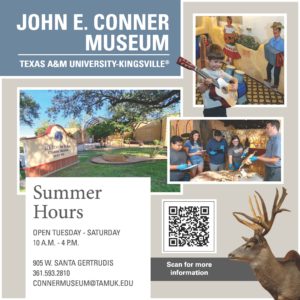Students, professors share thoughts on summer courses
Summer classes are mostly back to normal as the second session for student and professors begins and both look forward to the opportunities and benefits that summer courses provide.
Summer I took place between May 31 and July 1, closely followed by Summer II which began on July 5 and will end Aug 4. Classes take place Monday through Friday in person, meet online weekly, or are asynchronous online.
Sophomore Communications Sciences and Disorders major Corrina Hernandez took Texas Government during Summer I and plans to take Rhetoric and Composition and Lifespan Development Psychology in Summer II. She enjoyed finishing her Summer I course a week early and being able to get just a few more days off between both summer semesters. Hernandez looks forward to taking her psychology class in Summer II to complete her minor.
In order to continue working during the summer, Hernandez’s best option was to take her courses online, which will help her continue pursuing her degree.
“My first session went by like a breeze. I luckily had a really understanding professor who had every assignment open to do at our own pace. I am currently working two-part time jobs along with taking my summer courses so I thought my grades would suffer, however that was not the case. I ended up passing Texas government with an A. A big help was writing everything down in my planner and constantly checking updates with blackboard,” Hernandez said.
Hernandez’s Summer I online course was at full capacity, which allowed for good class discussion to hear different perspectives from different students, which is something Hernandez typically prefers. She is grateful that her professor, even with a full course, was readily available to answer any additional questions she had regarding the coursework. In turn, Hernandez made an effort to stay on top of her assignments.
“I definitely feel accountable to make good grades since I am volunteering my summer off to take classes to essentially get ahead of school. I feel as if the professors have higher expectations since we are not in the regular school year,” Hernandez said.
Students were not the only ones who experienced the multiple advantages OF registering for summer classes. Professors also made note of the benefits for both themselves and their students.
Dr. Kendra Huff has always taught at least one summer session at TAMUK, this year teaching Principles of Accounting I (ACCT 2301), a financial accounting course that is required for all business majors and minors.
She enjoys how quickly summer sessions fly by but makes note that everyone, students and professors combined, has to practice good time management skills because of it.
ACCT 2301 was taught online, although originally scheduled for face-to-face. Moving the course online doubled the enrollment. Huff believes that online classes work better in the summer because it allows students to work from home and interferes less with students’ work schedules.
“Class was online so attendance wasn’t really an issue. The main difference is that students really do not have time to goof around. We cover all the same material in the summer as in a regular semester so there really isn’t time to waste. It is fast and furious but nice to get it done in five weeks,” Huff said.
Huff’s hopes for the fall semester are that more students will be willing to attend face -to-face classes. Her classes are currently scheduled to be taught in person or hybrid, but she still makes accommodations for students because of COVID-19 and will teach them in all forms if needed.
Other professors had a different strategy, instructing in-person, but achieving similar, positive results.
Dr. Greg Sanders, who taught Orchestration for undergraduates in summer I and Music Technology for graduate students in Summer II, has noticed a difference between students who attend both summers and those who only attend summer II. He observes that those who only attend summer II classes struggle a bit more to get back into the routine of things, while those who attend both summers have a steady continuation of their education following the spring semester.
“In some ways attendance is better during the summer because the students have recognized that everything is so compact. My Orchestration is a bit of a tough class and they want to focus in on those five weeks immensely. The class that I have now has not had a single absence,” Sanders said.
He believes teaching summer courses is more intensive for both students and professors, especially teaching both summer sessions, only allowing two weeks of vacation per year. Sanders has mentioned to several administrators how advantageous summer sessions are for students, giving the opportunity to finish their degrees faster and get into their field of work sooner.
When given the option, Sanders has always chosen in-person classes. He recognizes how much the students appreciate the hands-on experience, especially within the music department.
“I felt like we needed to be here if we could. It was just something I had to do. I owed it to the students and myself to come back face-to-face, and it’s worth it,” Sanders said.

